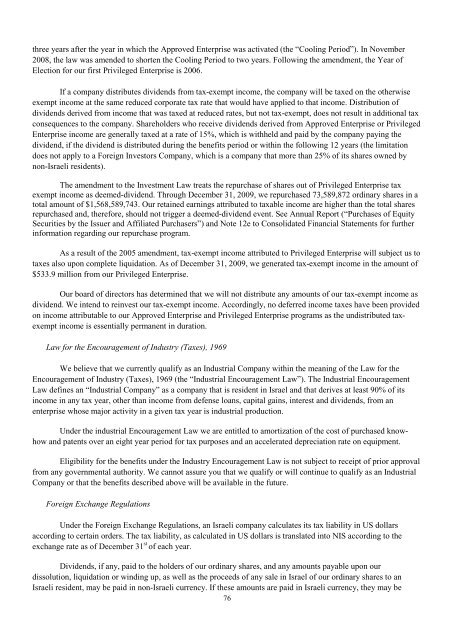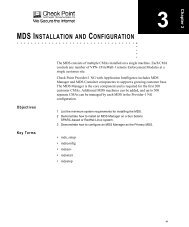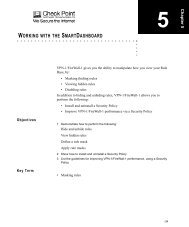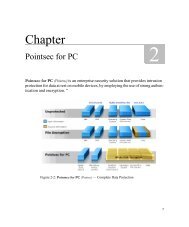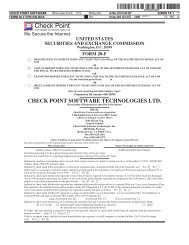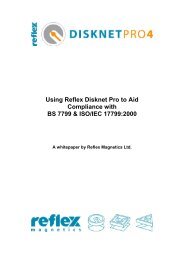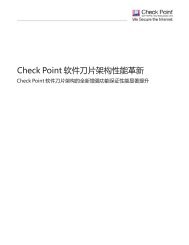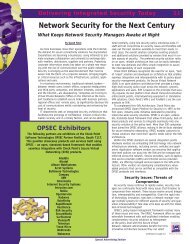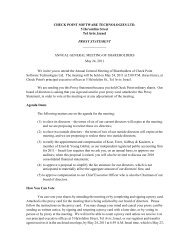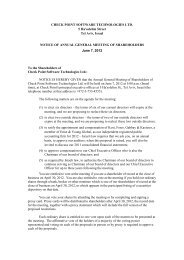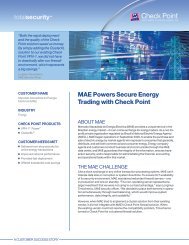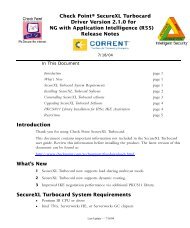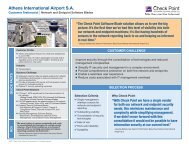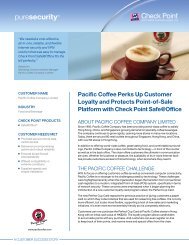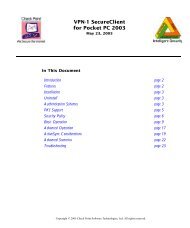FORM 20-F - Check Point
FORM 20-F - Check Point
FORM 20-F - Check Point
You also want an ePaper? Increase the reach of your titles
YUMPU automatically turns print PDFs into web optimized ePapers that Google loves.
three years after the year in which the Approved Enterprise was activated (the “Cooling Period”). In November<br />
<strong>20</strong>08, the law was amended to shorten the Cooling Period to two years. Following the amendment, the Year of<br />
Election for our first Privileged Enterprise is <strong>20</strong>06.<br />
If a company distributes dividends from tax-exempt income, the company will be taxed on the otherwise<br />
exempt income at the same reduced corporate tax rate that would have applied to that income. Distribution of<br />
dividends derived from income that was taxed at reduced rates, but not tax-exempt, does not result in additional tax<br />
consequences to the company. Shareholders who receive dividends derived from Approved Enterprise or Privileged<br />
Enterprise income are generally taxed at a rate of 15%, which is withheld and paid by the company paying the<br />
dividend, if the dividend is distributed during the benefits period or within the following 12 years (the limitation<br />
does not apply to a Foreign Investors Company, which is a company that more than 25% of its shares owned by<br />
non-Israeli residents).<br />
The amendment to the Investment Law treats the repurchase of shares out of Privileged Enterprise tax<br />
exempt income as deemed-dividend. Through December 31, <strong>20</strong>09, we repurchased 73,589,872 ordinary shares in a<br />
total amount of $1,568,589,743. Our retained earnings attributed to taxable income are higher than the total shares<br />
repurchased and, therefore, should not trigger a deemed-dividend event. See Annual Report (“Purchases of Equity<br />
Securities by the Issuer and Affiliated Purchasers”) and Note 12e to Consolidated Financial Statements for further<br />
information regarding our repurchase program.<br />
As a result of the <strong>20</strong>05 amendment, tax-exempt income attributed to Privileged Enterprise will subject us to<br />
taxes also upon complete liquidation. As of December 31, <strong>20</strong>09, we generated tax-exempt income in the amount of<br />
$533.9 million from our Privileged Enterprise.<br />
Our board of directors has determined that we will not distribute any amounts of our tax-exempt income as<br />
dividend. We intend to reinvest our tax-exempt income. Accordingly, no deferred income taxes have been provided<br />
on income attributable to our Approved Enterprise and Privileged Enterprise programs as the undistributed taxexempt<br />
income is essentially permanent in duration.<br />
Law for the Encouragement of Industry (Taxes), 1969<br />
We believe that we currently qualify as an Industrial Company within the meaning of the Law for the<br />
Encouragement of Industry (Taxes), 1969 (the “Industrial Encouragement Law”). The Industrial Encouragement<br />
Law defines an “Industrial Company” as a company that is resident in Israel and that derives at least 90% of its<br />
income in any tax year, other than income from defense loans, capital gains, interest and dividends, from an<br />
enterprise whose major activity in a given tax year is industrial production.<br />
Under the industrial Encouragement Law we are entitled to amortization of the cost of purchased knowhow<br />
and patents over an eight year period for tax purposes and an accelerated depreciation rate on equipment.<br />
Eligibility for the benefits under the Industry Encouragement Law is not subject to receipt of prior approval<br />
from any governmental authority. We cannot assure you that we qualify or will continue to qualify as an Industrial<br />
Company or that the benefits described above will be available in the future.<br />
Foreign Exchange Regulations<br />
Under the Foreign Exchange Regulations, an Israeli company calculates its tax liability in US dollars<br />
according to certain orders. The tax liability, as calculated in US dollars is translated into NIS according to the<br />
exchange rate as of December 31 st of each year.<br />
Dividends, if any, paid to the holders of our ordinary shares, and any amounts payable upon our<br />
dissolution, liquidation or winding up, as well as the proceeds of any sale in Israel of our ordinary shares to an<br />
Israeli resident, may be paid in non-Israeli currency. If these amounts are paid in Israeli currency, they may be<br />
76


